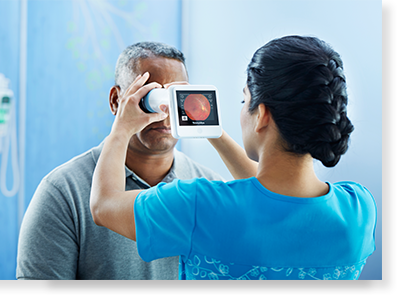Diabetic Retinopathy
Diabetes is a disease that profoundly affects many areas of your body, including your eyes. It increases your risk for eye conditions, such as glaucoma and cataracts. The primary concern for eye health in people with diabetes is the development of diabetic retinopathy. Diabetic retinopathy is a condition that develops when the blood vessels in your retina become damaged. Your eyesight may become blurry, less intense, and begin to disappear. Diabetes is the leading cause of blindness among people between the ages of 20 and 74 in the United States.
This condition can affect people with type 1 or type 2 diabetes. The longer you live with diabetes, the more likely you are to develop complications like diabetic retinopathy.
This is why adopting lifestyle changes and learning to manage diabetes is so important.
Symptoms of Diabetic Retinopathy
- Floaters, or dots and dark strings, in your field of vision
- Dark or empty areas in your field of vision
- Blurry vision
- Difficulty focusing
- Vision changes that seem to fluctuate
- Altered color vision
- Partial or total vision loss
Testing for Early Detection of Diabetic Retinopathy – RetinaVue™ Network

- Extreme thirst
- Frequent urination
- Drowsiness and lethargy
- Sugar in urine
- Sudden vision changes
- Increased appetite
- Sudden weight loss
- Fruity, sweet, or wine-like odor on breath
- Heavy, labored breathing
- Stupor or unconsciousness
Retinopathy Treatment
The best way to handle eye problems related to diabetes is through early detection of retinal abnormalities, regular monitoring, and prompt treatment. Early detection and treatment typically begin with the retinal exam. You may develop retinopathy and find that your symptoms don’t progress or stall entirely. If that happens, the likelihood you’ll be monitoring your eyes for changes for the rest of your life is high. If your provider diagnoses you with retinopathy and treats you for it, they may request exams several times per year. The number of eye exams you need each year will depend largely on the severity of the retinopathy.
Ongoing Vision Care
Treatments for diabetic retinopathy are often very successful, but they’re not a cure. Diabetes is a chronic condition, which means you’ll likely experience complications of the condition for the rest of your life. This includes vision problems. If you develop diabetic retinopathy, you may find relief with treatment, but you’ll need regular eye exams to monitor for worsening issues. You may eventually need more treatment for retinopathy.
Call to Schedule an Appointment
Alpharetta Internal Medicine Office
1380 Upper Hembree Rd.
Roswell, GA 30076
Cumming Internal Medicine Office
950 Sanders Rd
Cumming, GA 30041


